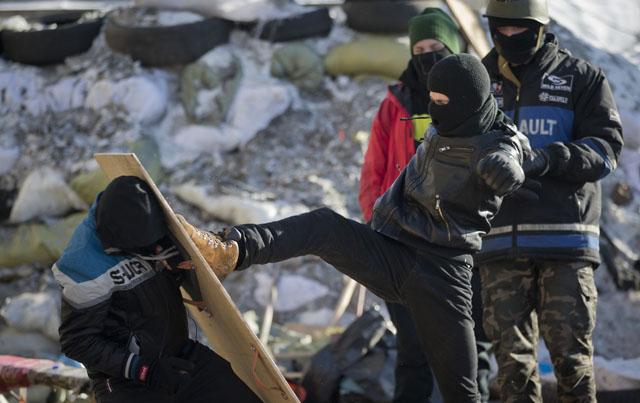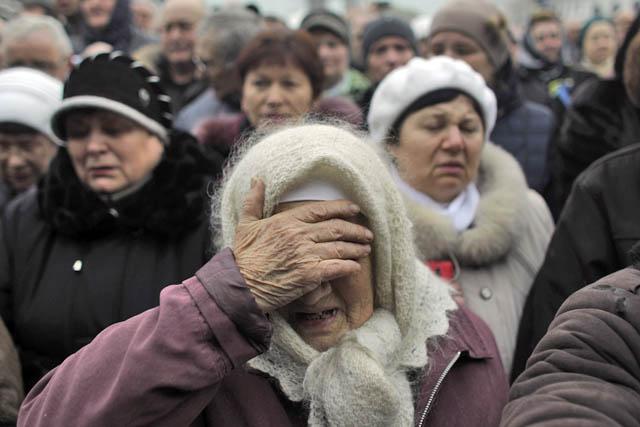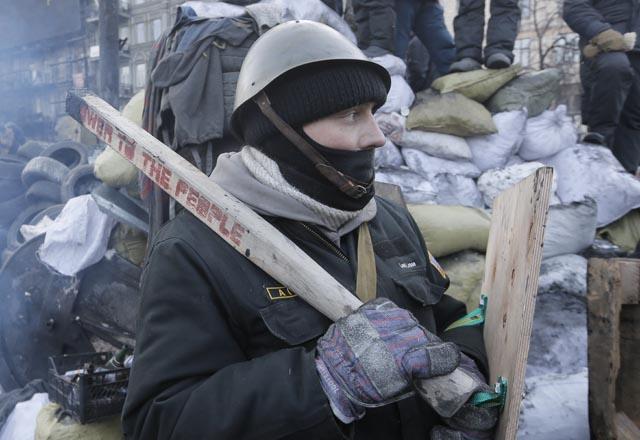KIEV — The threat of new protest violence in Ukraine is tapering off but the country’s two-month-old political and economic crisis remains far from being resolved, the European Union’s foreign policy chief said Wednesday.
EU envoy Catherine Ashton spoke after meeting with President Viktor Yanukovych, who has been the focus of months of massive protests demanding his resignation.
The protesters have built a large tent camp in the central square of Kiev, the capital, and have erected high barricades of snow and scrap materials to cut off key downtown sections.
An uneasy truce between police and protesters has been held since late January after the protests erupted into four days of violent clashes. Officials say three people died in the melee, two of them of gunshot wounds.
“Although there is a sense that violence is decreasing, there is still great concern about the situation on the ground,” Ashton told reporters.
She said 28-nation EU has been discussing financial aid to Ukraine, but dismissed suggestions floated by some opposition leaders that the country deserves something akin to the Marshall Plan, the successful US initiative to rebuild European economies after World War II.
The perilous state of Ukraine’s economy, which relies on energy-inefficient heavy industries and gas imports from Russia, is a key issue in the crisis. Ukraine’s reserve funds fell some 25 per cent over the past year and in December officials said the country would need at least $10 billion in the near future to pay its debts.
Ashton met Tuesday evening with one of the opposition leaders heading the protests against Yanukovych, which erupted over his decision to shun the EU and turn to Moscow for a desperately needed rescue loan instead.
Opposition leader Arseniy Yatsenyuk told The Associated Press that no specifics of Western aid were put forth by Ashton in their talks.
He also charged that Ukraine’s president was “targeting ways how to buy time and drag us into never-ending talks and discussions”.
The Ukrainian currency, the hryvna, has fallen some 7 per cent since the protests began in late November and some Ukrainians think Yanukovych sees the drop as working in his favor.
“Yanukovych thinks that the collapse of the hryvna is scaring Ukrainians and they will stop the protests. But the collapse of the economy will only speed up the exit of these talentless authorities,” said Oleg Ternovskiy, a small businessman in Kiev.
In late November, Yanukovych backed off from an expected agreement to deepen economic relations with the EU, fearing that the bloc was not offering an adequate cushion for the trade that could be lost with Russia, which wanted Ukraine to join a Moscow-led customs union. Yanukovych subsequently obtained a $15 billion aid package from Russian President Vladimir Putin, including getting lower gas prices from Russia.
The turn toward Moscow angered those who resent the long shadow that Russia casts on Ukraine. The protests began on that note but have since morphed into demands for more human rights, less corruption, Yanukovych’s resignation and a new election.
EU officials have indicated that aid to Ukraine could be sweetened but no specifics have been offered.
The West likely would seek a resolution to Ukraine’s political crisis before offering more aid.
No resolution is in sight, however. Prime Minister Mykola Azarov resigned last week so the Cabinet is operating only as a placeholder. The leader of his party’s faction, Olexander Efremov, said Wednesday he expected a new premier to be nominated next week.
Yanukovych offered the premiership to Yatsenyuk, who turned it down. Under the current system, the prime minister has relatively little power compared with the president. The opposition is seeking a return to an older system under which the premier and parliament have more authority.
Russia has released $3 billion of its aid to Ukraine, but Putin indicated last week that future tranches would be delayed until a new government is formed.


















